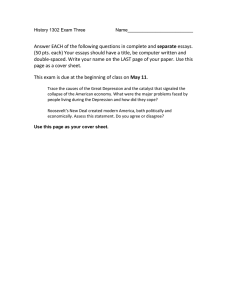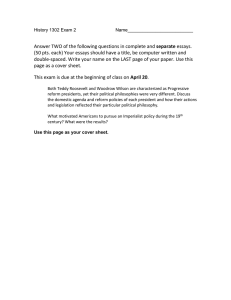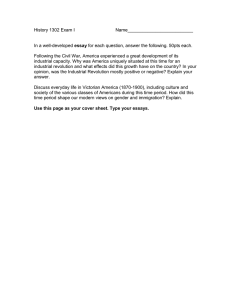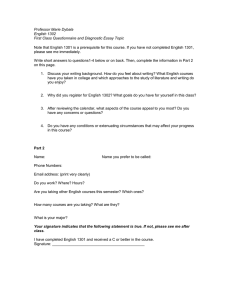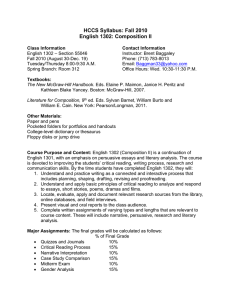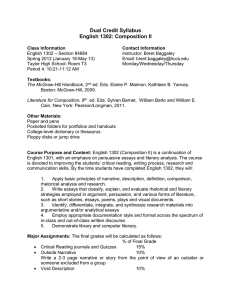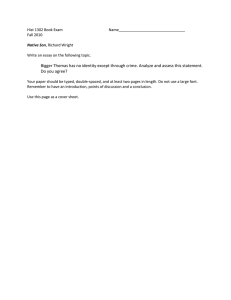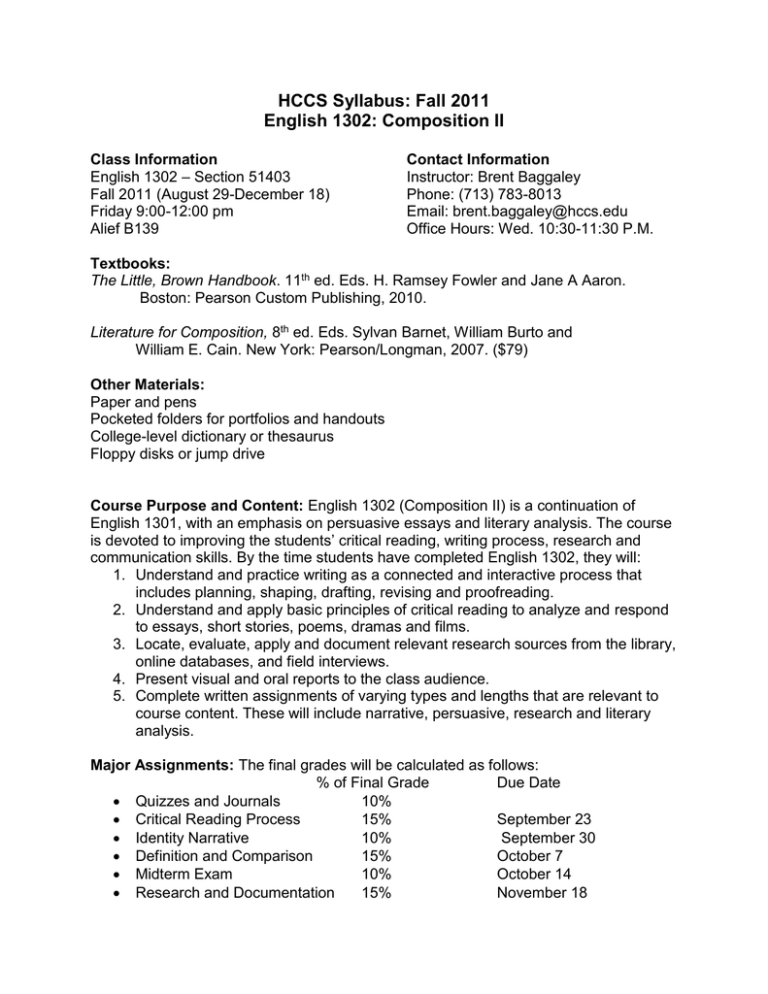
HCCS Syllabus: Fall 2011
English 1302: Composition II
Class Information
English 1302 – Section 51403
Fall 2011 (August 29-December 18)
Friday 9:00-12:00 pm
Alief B139
Contact Information
Instructor: Brent Baggaley
Phone: (713) 783-8013
Email: brent.baggaley@hccs.edu
Office Hours: Wed. 10:30-11:30 P.M.
Textbooks:
The Little, Brown Handbook. 11th ed. Eds. H. Ramsey Fowler and Jane A Aaron.
Boston: Pearson Custom Publishing, 2010.
Literature for Composition, 8th ed. Eds. Sylvan Barnet, William Burto and
William E. Cain. New York: Pearson/Longman, 2007. ($79)
Other Materials:
Paper and pens
Pocketed folders for portfolios and handouts
College-level dictionary or thesaurus
Floppy disks or jump drive
Course Purpose and Content: English 1302 (Composition II) is a continuation of
English 1301, with an emphasis on persuasive essays and literary analysis. The course
is devoted to improving the students’ critical reading, writing process, research and
communication skills. By the time students have completed English 1302, they will:
1. Understand and practice writing as a connected and interactive process that
includes planning, shaping, drafting, revising and proofreading.
2. Understand and apply basic principles of critical reading to analyze and respond
to essays, short stories, poems, dramas and films.
3. Locate, evaluate, apply and document relevant research sources from the library,
online databases, and field interviews.
4. Present visual and oral reports to the class audience.
5. Complete written assignments of varying types and lengths that are relevant to
course content. These will include narrative, persuasive, research and literary
analysis.
Major Assignments: The final grades will be calculated as follows:
% of Final Grade
Due Date
Quizzes and Journals
10%
Critical Reading Process
15%
September 23
Identity Narrative
10%
September 30
Definition and Comparison
15%
October 7
Midterm Exam
10%
October 14
Research and Documentation
15%
November 18
Visual Analysis and Argument
Final Exam
15%
10%
November 4
December 2
Course Goals and Skills:
· READING: Reading material at the college level means having the ability to analyze
and interpret a variety of materials -- books, articles, and documents.
· WRITING: Writing at the college level means having the ability to produce clear,
correct, and coherent prose adapted to purpose, occasion, and audience. In addition
to knowing correct grammar, spelling, and punctuation, students should also
become familiar with the writing process, including how to discover a topic, how to
develop and organize it, and how to phrase it effectively for their audience. These
abilities are acquired through practice and reflection.
· SPEAKING: Effective speaking is the ability to communicate orally in clear,
coherent, and persuasive language appropriate to purpose, occasion, and audience.
· LISTENING: Listening at the college level means the ability to analyze and interpret
various forms of spoken communication.
· CRITICAL THINKING: Critical thinking embraces methods of applying both
qualitative and quantitative skills analytically and creatively to subject matter in order
to evaluate arguments and to construct alternative strategies. Problem solving is one
of the applications of critical thinking used to address an identified task.
· COMPUTER LITERACY: Computer literacy at the college level means having the
ability to use computer-based technology in communicating, solving problems, and
acquiring information. Core-educated students should have an understanding of the
limits, problems, and possibilities associated with the use of technology and should
have the tools necessary to evaluate and learn new technologies as they become
available.
II. EXEMPLARY EDUCATIONAL OBJECTIVES: ENGLISH 1302
By the time they have completed English 1302, students will
• demonstrate the ability to use consistently and effectively the writing process for both
in-class and out-of-class essays (thus reinforcing English 1301 instruction);
• understand and apply the basic principles of critical thinking—evaluation, analysis,
and synthesis— as they write essays that persuade or argue;
• be able to analyze, in writing, readings by professional and student writers (for such
elements as purpose, audience tone, style, writing strategy, and for much deeper
meanings);
• be able to develop a critical and creative essay in response to an issue related to
reading(s) or other class projects;
• demonstrate the ability to resist simplistic formulations, whether in their own or others’
texts;
• understand the characteristics of imaginative texts and write effective analyses of
various genres;
• be able to acknowledge, as appropriate, their own history, interests, and biases as
they discuss a topic, thus placing themselves credibly in the discussion;
• develop the ability to research and write a documented paper;
• make effective stylistic choices (diction, tone, sentence structure) in all writing
assignments, depending upon the audience and purpose of a piece of writing;
• apply suggestions, as appropriate, from evaluated compositions to other writing tasks;
and
• fulfill the writing requirements of the course, writing at least 6000 words during the
semester.
Grading Scale: Essays and exams will be scored on a rubric of 1-10, “10” being the
highest score, and “1” the lowest. For the purposes of grade calculation, an average
score of 9-10 will earn an A, 7-8 a B, 5-6 a C, 3-4 a D, and anything below, an F.
Students will be provided with the rubric of criteria ahead of time.
Attendance Policy: Regular Attendance is required at Houston Community College.
HCCS class policy states that a student who is absent for more than 12.5% (6 hours) of
class may be administratively dropped. Students who intend to withdraw from a course
must do so by the official date or they may receive an F instead of a W. Attendance will
be taken every class period and this policy will be enforced. Students who are more
than 10 minutes late for class will not be allowed into the classroom, and will be marked
as absent.
Policy on Academic Dishonesty: Scholastic dishonesty includes, but is not limited to:
Plagiarism: the appropriation of another person’s work, and the unacknowledged
(without MLA or APA documentation) incorporation of that work into one’s own
work for credit.
Collusion: the unauthorized collaboration with another person, whether from the
class or from the internet, in preparing written work for credit.
A student guilty of a first offense will receive a grade of 0 on the assignment involved.
For a second offense, the student will receive an F for the course.
Other Course Policies:
Please turn off cell phones and beepers prior to entering the classroom.
Please be prepared to take notes during class.
Late papers will not be accepted. There will be no extensions of due dates.
Please do not chat with class colleagues during discussion.
Please do not pack up books and belongings prior to being dismissed – I will
announce when class has been completed and it is time for you to leave.
If you should miss class for any reason, it is your responsibility to make up the work you
missed and to contact me by phone or email for any special instructions on work you
missed.
This Syllabus, and all other calendars, assignment sheets and handouts can be found
on the Learning Web page. Go to www.hccs.edu.

